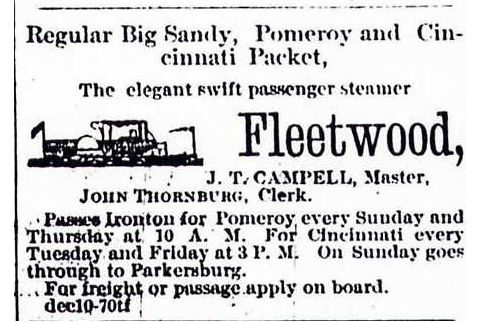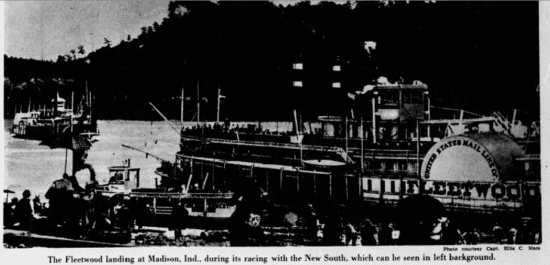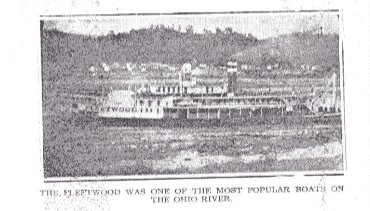GREAT CAREER CAPTAIN SCOTT
Pioneer Mariner From this County Died in West at the age of 86
Researched by Sharon M. Kouns
The following clipping from Morning Oregonian of June 24, 1913, was received by Attorney Frederick Bonser of Cheyenne, Wyoming. Captain Uriah Bonser Scott is referred to as an old resident of Scioto county, Ohio, who immigrated and became one of the empire builders of the great northwest.
Smith Bonser, a relative of Capt. Uriah Bonser Scott is also an old resident, a grandson of Major Isaac Bonser, one of the county’s first settlers. He has passed the three-quarters of a century mark. The clipping is under that Captain W.B. Scott is dead, and Pioneer Mariner succumbs to heart disease at 86. Boats testify to the ability of remarkable shallow draft vessels built from unique designs in service still at many points on the Pacific coast.
The article reads: Captain W. B. Scott, foremost of Columbia River pioneer boatmen, died yesterday morning of heart disease at age 86. Capt. Scott was commodore of the Columbia River and Puget Sound Navigation Company until a year ago, when he resigned.
His death occurred in Woodland, Washington., where he lived on his son’s ranch with his wife and son, E.B. Scott.
Captain Scott came to Portland from Ohio 40 years ago. He had been master and pilot of Ohio river vessels, and upon arriving in Portland, built a river boat, Ohio, which drew less than 18 inches laden and made a trip to Eugene in her. This craft cleared $10,000 in three months and was copied by many other builders. Those who were partners in this venture were; Lamar B. Seeley, Samuel H. Brown, the late E.W. Crichton, and Z.T. Hatch, now in California.
Origin of Boats Remarkable.
Captain Uriah Bonser Scott was a noted pilot, ship Captain, and expert designer. He designed his boat from knowledge gained by experience. Among them were some remarkable shallow draft vessels, including the city of Salem, another riverboat, the Fleetwood, which ran to the Cascades, and the Telephone. The old Telephone was the most famous of his productions, as it was the fastest stern-wheel boat built. The third generation is now using her in San Francisco Bay.



The Flyer has made four round trips between Tacoma and Seattle daily for nearly 22 years. The Telegram was another of the stern-wheel type. This boat was brought to Portland from the sound during the Lewis & Clark Fair when it carried many excursions on the Columbia River. The City of Everett on Puget Sound is another successful steamboat to his credit as a builder.
Passenger’s Lives Saved; Captain Uriah Bonser Scott’s presence of mind saved the lives of the passengers on the Telephone when she was on fire four miles from Astoria. He ordered the engines put full speed ahead and landed all on board safely. Besides his wife and son at Woodland, another son at Seattle, Charles O. Scott survives.
The following are excerpts from “History of the Columbia River Valley, from The Dalles to the Sea, by Fred Lockley 1928.
From the iron regions of Ohio in the early 1870s came L.B. Seeley and Samuel Brown, the advance guard of what was sometimes known in the transportation and industrial circles of the Willamette Valley as “the Ohio crowd.” They had established contact with an experienced river steamboatman and builder with several highly successful boats on the Ohio River to his credit.
This man, Capt. Uriah Bonser (nicknamed “Ubiquitous”) Scott. After meeting with reverses in Ohio, he arrived in Portland in 1873. He immediately recognized an opening on the Willamette for a man of his talent in a special direction. The U.B. Scott Steamboat Company was incorporated in 1875 by Scott, Seeley, Brown, M.S. Burrell, and Z.J. Hatch. Perry and Newton Scott worked with Capt. Scott is an engineer on his boats.
The Telephone was one of the best money makers that operated on the lower river, enjoyed the cream of the passenger trade, and could carry heavy freight cargo. She was destroyed by fire in Nov.1, 1887, while entering Astoria harbor with full cargo and about 200 passengers.
As pathfinders in the direction of improved steamboating methods, Capt. “Ubiquitous” Scott, L.B. Seeley, and the rest of the “Ohio Crowd” will long be remembered for their work during a picturesque period in the history of the Willamette Valley.
Children of URIAH SCOTT and CLARINDA LIONBARGER are:
- i. WILLIAM V. SCOTT, b. Abt. 1853.
- ii. MARY GENEVIEVE SCOTT, b. June 1854, Ironton, Lawrence County, Ohio; d. August 10, 1855.
- iii. BENJAMIN FAYETTE SCOTT, b. June 09, 1858, Ironton, Lawrence County, Ohio; d. August 16, 1859.
- iv. JOHN E. SCOTT, b. May 1860, Lawrence County, Ohio; d. Bef. 1870.
- v. EUSTACE B. SCOTT, b. May 06, 1871, Ironton, Lawrence County, Ohio.
- vi. CHARLES DAY SCOTT, b. June 01, 1873, Missouri; d. May 04, 1954, La Center, Washington.
- vii. LAMAR SCOTT, b. April 1875, Portland, Multnomah Co., Oregon ?; d. April 1884, Cathlamet, Washington.
The Oregonian, Nov. 11, 1906, page 32
WINS FAME AND FORTUNE STEAMBOATING
Captain U. B. Scott, Veteran Riverman, Is Approaching the Eighties and Is Still in the Harness.
In the beginning, there was a conspiracy on the part of several of us to inveigle Captain Scott into talking about himself. The Captain objects strongly to publicity, possibly because he doesn’t like newspapers and newspapermen. Some people feel that way, and they’re entitled to hold their position. It doesn’t matter much in the long run – there are ways to circumvent them.
We played a harmless trick on Captain U. B. Scott, one of the last leaves among pioneer American steamboat men. He will be 80 years old in many weeks, but getting the best of him is still hard. It required all the strategy of a clever woman to induce him to talk about himself before a group of us the other evening, and a great surprise is in store for him when he reads this.
I was struck by the splendid octogenarian’s masterful way, with his even carriage, keen eye, and active brain. Surely it is worth getting old for – as old age, without bitterness- when the wine of life still has a head on it, when the rising up for the day still means something that one may look forward to, to still be useful in a world where men have work to do. Captain Scott’s old age sits gracefully upon him.
Many traditions and customs of the older days cling to him. Somehow his well-made and well-polished topboots of calfskin give him distinction, as does the old-fashioned cut of his clothes. They identify him with the antebellum period when life was simpler, cleaner, and more dignified. But it is largely in outward semblance that the old gentleman suggests the past. His interest in the present is keen, and it was a task to draw him into reminiscences.
“I don’t know why you’re interested in the fact that I went out as an apprentice as a small boy, away back in the latter ’30s, he began as the skein of his memory began to untangle. “My experience was not much different from the experience of dozens of boys I knew in Ohio in those early days.
I had to help make the family living, so I went to work for an ironworker. I got my boarding and lodging but had to find my own clothes. I remember how I learned to make knives and such light things out of steel, and after regular working hours, I would put in the time at the shop, making little things to sell so I could buy clothes.
“They let me do that, and I could earn a quarter or so a night at it, and that’s how I dressed. I think I was 15 when I bought my first suit of store clothes. The man I bought ’em of cheated me, and the pants only came down halfway between my knees and my feet. I didn’t mind that so much because they were better than most other boys.
The proudest time was when I saved enough money to buy fine shoes. I went to church the next Sunday, proud as a dude, but for fear I would wear ’em out too fast. I walked the two miles I had to go barefooted and carried the shoes in my hand. When I got to the church door, I put ’em on, and when a meeting was over, and I got outside off, they came, and I trudged back home with them under my arm.
I don’t suppose I looked very fancy but thought I did and was proud of myself.” So the Captain took us in hand and led us back along the path of long years. It was all interesting from his life in Ohio when Ohio was almost the frontier.
All of you may not know that Captain U. B. Scott is an Oregonian who has followed our rivers successfully for many years as he did those of the Middle West for almost a generation before he ever saw the Columbia. He is still in the harness, and his crack boats, Telegraph and the Portland-Astoria run, and the City of Everett on the sound keep him in touch with commercial affairs. However, he no longer personally navigates his own boats. He has turned the wheel over to younger captains, but much of his time is still spent aboard them.
Steamboating on Ohio
It was in 1854 that he took to steamboating on the Ohio River. At that, he had already made a success in making machinery and was a man of the family. He invested a few thousand dollars he had saved in a bank and learned navigation. ____ _____ with a considerable profit between Ohio and Kentucky river towns. When the Civil War came, he had already built and sold several packets for the trade and was the owner and master of another when the Government impressed them for military service.
During the Rebellion, he ran his boats in the Ohio, Mississippi, and Cumberland rivers, transporting troops and supplies for the Federal armies. He was amid war’s alarms for four years, and his service, though in a civil capacity, was at times more hazardous than if he had been a soldier.
After the War, he took his boat South and entered the Lower Mississippi and Red River trade, carrying cotton from the upriver plantations in New Orleans. He made a fortune and then lost most of his property through bank failures and other mishaps.
It was then, to be exact, in 1873, that he became interested in Oregon and came out to Portland to begin over again. He had little means, but he saw the possibilities of Willamette River navigation and managed to scrape together sufficient money. I think he told me $12,000 to build a boat to run on the upper river.
He built a scow, remodeled it somewhat, built a cabin upon it, and when completed, had a steamboat that drew so little water that it could navigate in a heavy dew. This was in the Summer of ’73, and Ohio, which he called the boat, was the town joke. The river was low, and none of the boats in commission could get by the Clackamas Rapids, so Oregon City, Salem, and the other river towns were left high and dry for water transportation facilities.
Captain Scott proposed to run Ohio to Salem and beyond despite hades and low water. Old-timers will remember how the town laughed at him and the monstrosity he had built to run in eight inches of water. But he fooled them all. After days of delay, he finally signed a pilot who took the proposition seriously and so one day steamed up the river.
They went to Salem without untoward incident and then, grown bold, continued on their way to Albany. The shippers at every landing fairly mobbed the boat in their eagerness to load freight for Portland, and Ohio, after turning away many tons of cargo, returned loaded to the guards to give the Portland wiseacres a laugh. When the boat whistled for the landing, the whole population welcomed her.
Colonel Joe Teal was one of the few who had believed in the venture, and when Ohio came steaming in with Captain Scott at the wheel, proud as a conqueror, Colonel Joe mounted a barrel and shouted: “How much freight have you got, Captain Scott?”
“A hundred tons,” answered the plucky navigator.
“I knew you’d do it. I knew you would. Captain Scott, if you tell me you can jump across the river, I’ll believe you. So help me, I will,” the Colonel shouted.
Wins Both Fame and Fortune
This marked the successful beginning of a career of steamboating on the Willamette and Columbia, which has been in many respects remarkable. Captain Scott made enough out of the “Ohio” that first Summer to build a better boat, the City of Salem, and since then, has prospered exceedingly.
He built and operated the two Telephones, establishing the record for fast time between Portland and Astoria. Some eight years ago, the Captain retired from active work on the river, but he still directs the business of the Telegraph and City of Everett, which are valuable properties.
At 80, he is energetic and works as few men his age can. He has found the secret of living long and happily and is now satisfied with the world that has lived this long time and with the people. He faces the sunset and watches his day wane with a brave face- smiling and unafraid.

0 Comments